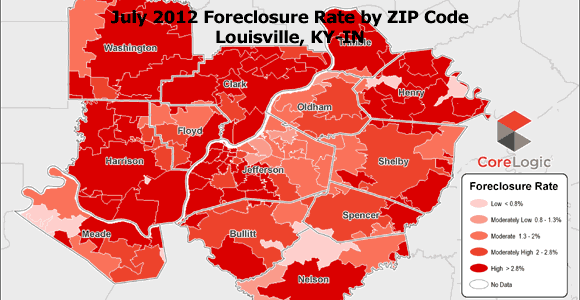According to CoreLogic, foreclosure rates drop in Louisville as we watch the number of homes going into a foreclosure proceeding. This information was released in their most recent report. CoreLogic is a company that tracks and publishes data-driven reports, many centered around real estate, finances, and consumer goods.

Foreclosure Rates Drop in Louisville
The CoreLogic data reveals that the rate of Louisville-Jefferson County area foreclosures among outstanding mortgage loans was 2.71 percent for the month of July 2012, a decrease of 0.21 percentage points compared to July of 2011 when the rate was 2.92 percent. Foreclosure activity in Louisville-Jefferson County was lower than the national foreclosure rate which was 3.25 percent for July 2012.
The peak for foreclosures in Louisville was 3.05% in January of this year and has declined since. Louisville generally follows the national trend with a time delay of about 9-15 months.
What is also noteworthy, is that Louisville foreclosure rates are also dropping. Just 5.80% percent of mortgage loans were 90 days or more delinquent in July, compared to 5.87% one year earlier. Small improvement but needed greatly.
How Foreclosures Work
Foreclosure is a legal process that occurs when a homeowner is unable to make their mortgage payments, leading the lender to seize and sell the property to recover the outstanding loan amount. The process typically begins with the lender issuing a notice of default after several missed payments, giving the homeowner a specified period to rectify the situation. If the homeowner fails to catch up on payments, the lender will proceed with a public auction where the property is sold to the highest bidder. The proceeds from the sale are used to pay off the remaining mortgage debt, and any excess funds may be returned to the homeowner.
During foreclosure, homeowners have certain rights and opportunities to prevent the loss of their property. They can negotiate with the lender for a loan modification, refinance the mortgage, or sell the property themselves through a short sale. Additionally, many jurisdictions require lenders to provide a period of notice and may mandate mediation or other forms of dispute resolution before finalizing the foreclosure. If the property is sold at auction and the sale does not cover the entire debt, the lender may seek a deficiency judgment against the homeowner for the remaining balance. However, in some states, anti-deficiency laws protect homeowners from owing any shortfall.



